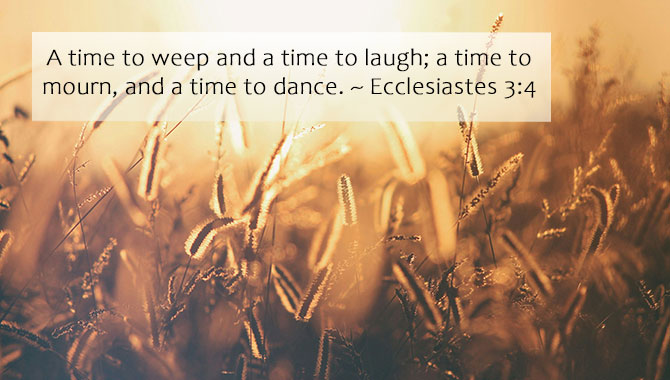A time to weep and a time to laugh; a time to mourn, and a time to dance. ~ Ecclesiastes 3:4
My father was the quiet rock in our family. He was never too high or too low, just a steady drip of grace, the calm in the middle of our storms. Dad died when I was thirty-eight years old, and the rock I stood on crumbled beneath my feet.
I remember his passing well. Me, my mom, my sister, and Jennifer were all sitting around Dad in his bed. Jennifer sang “Amazing Grace,” and we said the Lord’s Prayer together. Dad mumbled the words with us. In union, we said, “Amen, Amen, Amen” just like Dad always did. A faint smile crossed his lips.
We held it together for Dad, told him we would be all right, thanked him for loving and providing for us, we told him how much we loved him, and that he was free to go. However, when his life breath slowed down and then stopped, the grief and the sorrow were instant. The painful, agonizing tears released within us from a deep place and would not stop. We clung to the fading warmth of his body. “How would I go on without Dad?”
My Aunt Joyce, a stoic German farm wife and teacher from Kansas, was with us to offer support. When Dad died, she stood in the doorway with her hands on her hips like a football coach. “You live… You die,” she said. “We need to get this house ready for company.” And she started to vacuum the room where all of us were trying to breathe and move.
Jennifer started laughing. “Do you think we could get Bob out of the room before we start cleaning?” All of us started chuckling, even Mom. Aunt Joyce continued to vacuum the room when she got next to us sitting on the bed with my deceased Dad. “Pick up your feet,” Aunt Joyce said. “I need to vacuum under the bed.”
Jennifer lost it and her gentle laughter turned into a full-blown roar. She grabbed a pillow to muffle her laugh, and we buried our heads to conceal our laughter as well. Joyce left the room, and we could not stop laughing at the scene playing out before us. Our tears of heartfelt sorrow mixed in with tears of absolute joy.
“There is a time to weep, and a time to laugh; a time to mourn, and a time to dance,” (see Ecclesiastes 3:4) and sometimes all these emotions and feelings happen all at once. They co-exist and complement one another.
Do we take time to mourn and grieve our losses and the tragedies of life and do we take time to celebrate the beauty, the joy, and the hidden graces of life?
All of us around my father when he passed agreed that Aunt Joyce was an angel sent from God to help alleviate our sorrow. We are forever thankful to her and God. Father Rohr says, “There is a straight line between love and suffering (I would add grief and sorrow as well.). If we love greatly, it is fairly certain we will soon suffer, because we have given up control to another. That is my simple definition of suffering: whenever we are not in control.”
Do we struggle to give up control? What is the balance in our lives and in our community between laughing and weeping, dancing and mourning?
My experience in life manifests that joy is fleeting and sorrow lingers a long time, so it is easy for me to forget or not notice the small everyday joys and graces in life: a good cup of coffee made with love, a walk without a destination, a friendly smile, sparrows sitting on a telephone wire, an unexpected call from a friend.
By the Grace of God, we can live in joy and sorrow simultaneously. Jesus turned water into wine and celebrated the joy of life with his community at the wedding at Cana. Later, Jesus weeps and mourns with Mary, Martha, and the community when Lazarus dies.
Love and suffering; joy and grief are a natural part of life. “Without any doubt, they are the primary spiritual teachers,” says Rohr. What do we learn from each one?
I appreciate that my mom knew suffering and joy quite well. She told me years after my dad and sister died, “At first, the sorrow and the pain suffocated me. It was like I could not breathe. Now, I can breathe and enjoy life, but the sorrow is always there.”
“Love and suffering are the main portals that open the mind space and the heart space (either can come first) breaking us into breadth and depth and communion,” writes Rohr. They lead us into grace, peace, and joy. Jesus says, “Very truly, I tell you, you will weep and mourn, but the world will rejoice; you will have pain, but your pain will turn into joy,” (John 16:20).
May we take time to weep and time to laugh, time to mourn and time to dance. May we trust God that our sorrow will turn into joy. Amen.
Blessings and peace,
Craig

